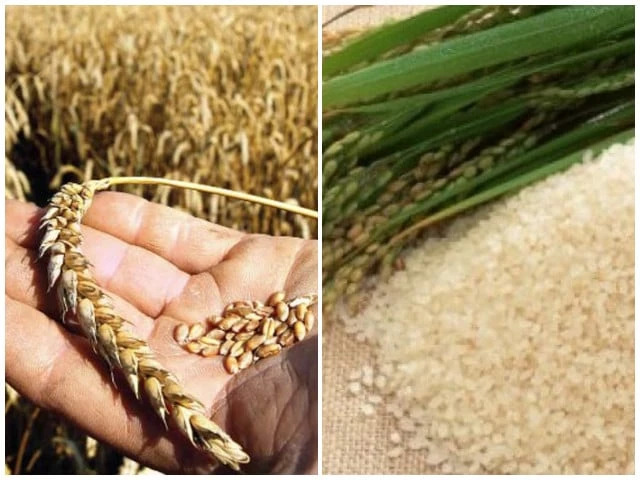ISLAMABAD:
The government has set a wheat production target of 29.68 million tonnes for the 2025-26 Rabi season.
The Federal Committee on Agriculture (FCA), chaired by Federal Minister for National Food Security and Research Rana Tanveer Hussain, reviewed the performance of the 2025-26 Kharif crops and approved production targets for the upcoming Rabi crops.
The meeting was attended by provincial agriculture ministers, secretaries and senior officials of federal and provincial departments.
The Ministry of National Food Security and Research has proposed a wheat production target of 29.68 million tonnes on an area of 9.65 million hectares.
The production targets for chickpeas, potatoes, onions and tomatoes have been set at 393, 8,916, 2,788 and 659,000 tonnes, respectively.
The ministry has also finalized the wheat policy to ensure that farmers receive fair support prices, enabling them to cover production costs and earn reasonable profits.
The minister said the policy reflects the government’s commitment to protecting the interests of farmers and achieving self-sufficiency in staple food crops.
The committee also reviewed the availability of seeds for Rabi crops. The Director General of the Federal Seed Certification and Registration Department (FSC&RD) informed that the availability of certified seed for Rabi 2025-26 will remain satisfactory.
Regarding water availability, the IRSA advisory committee anticipated that there will be no water shortage in Punjab and Sindh during Rabi 2025-26. The provinces have been allocated 33.814 million acre feet (MAF) of water.
During the meeting, the Committee was informed that sugarcane production for 2025-26 is provisionally estimated at 84.7 million tons on an area of 1,146 million hectares, which represents an increase of 5.5% in area and 5.9% in production over the goals set by the FCA.
Rice production for 2025-26 is estimated at 9,417 million tons on an area of 3,039 million hectares, indicating an increase of 21.9% in area and 2.7% in production with respect to the established objectives. Likewise, mung bean production for 2025-26 is estimated at 150.8 thousand tons on an area of 170.6 thousand hectares, which represents an increase of 22.9% in area and 1.2% in production compared to last year.
In line with the government’s agenda to promote the agricultural sector, Rana Tanveer Hussain appreciated the efforts of the State Bank of Pakistan to improve the flow of agricultural credit. The SBP assigned an indicative farm credit disbursement target of Rs. 2572 billion for FY2025, which was 16.3% more than the outlay of Rs. 2250 billion. Currently, 47 financial institutions provide agricultural loans to farmers, including five large commercial banks, 13 medium-sized national private banks, six Islamic banks, two specialized banks (ZTBL and PPCBL), 11 microfinance banks and 10 MFIs/RSPs.
During FY2025, lending institutions disbursed Rs. 2577 billion, achieving 100.2% of the overall annual target and registering a growth of 16.3% compared to Rs. 2215 billion disbursed in the corresponding period last year. The Committee was also informed that the supply of urea and DAP fertilizers is expected to remain stable during the upcoming Rabi season (November-December 2025).
Federal Minister Rana Tanveer Hussain said the government under the leadership of the Prime Minister is fully committed to strengthening the agriculture sector, ensuring food security and raising the standard of living of farmers through better pricing mechanisms, access to credit and availability of quality inputs. He emphasized that the agricultural sector is the backbone of the national economy and its stability contributes directly to national growth, rural prosperity and employment generation.
The Minister appreciated that despite the challenges of floods, climatic variations and global market fluctuations, all provinces have shown commendable performance by achieving better than expected results during the Kharif season. He also acknowledged the joint efforts of provincial departments and farmers for their dedication and resilience in maintaining productivity under difficult circumstances. Rana Tanveer Hussain said the Ministry of National Food Security and Research would continue to implement reforms to modernize agriculture through research, innovation and sustainable practices.
The purpose of the Federal Agriculture Committee is to review crop productivity in the provinces, assess the challenges facing the agricultural sector and finalize production targets and policy directions for the upcoming crop seasons.
The Metrological Department reported that generally below-normal rainfall is expected in most parts of the country during November and December, while near-normal rainfall is expected in January 2026. The department clarified that rumors circulating on social media about an extremely cold winter are unfounded and false.
In his concluding remarks, Rana Tanveer Hussain reiterated the government’s resolve to ensure food security through coordinated efforts at the federal and provincial levels. He said farmers are the backbone of the country’s progress and their prosperity remains one of the government’s top priorities. The Minister also underlined the importance of timely implementation of policies, better irrigation management, mechanization and increased investment in research and development to ensure sustainable agricultural growth.




